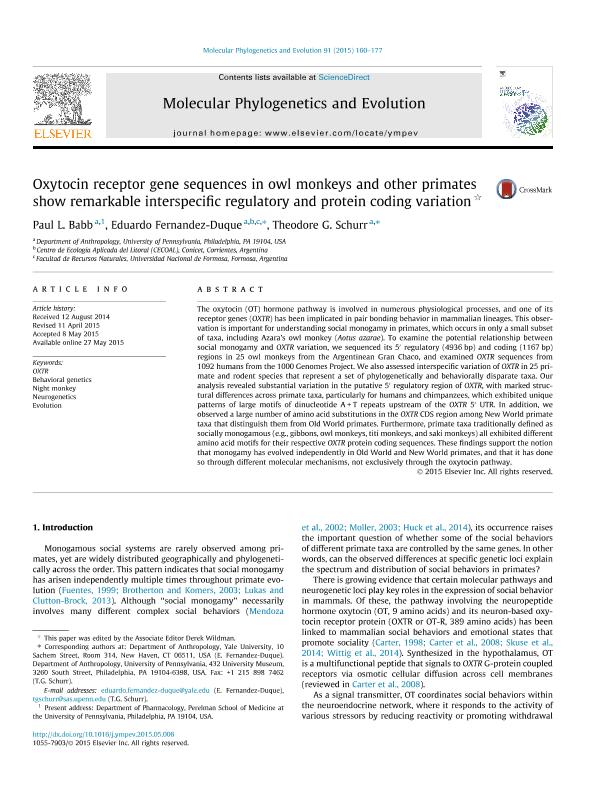Mostrar el registro sencillo del ítem
dc.contributor.author
Babb, Paul L.
dc.contributor.author
Fernandez Duque, Eduardo

dc.contributor.author
Schurr, Theodore

dc.date.available
2023-01-03T18:01:22Z
dc.date.issued
2015-10
dc.identifier.citation
Babb, Paul L.; Fernandez Duque, Eduardo; Schurr, Theodore; Oxytocin receptor gene sequences in owl monkeys and other primates show remarkable interspecific regulatory and protein coding variation; Academic Press Inc Elsevier Science; Molecular Phylogenetics and Evolution; 91; 10-2015; 160-177
dc.identifier.issn
1055-7903
dc.identifier.uri
http://hdl.handle.net/11336/183211
dc.description.abstract
The oxytocin (OT) hormone pathway is involved in numerous physiological processes, and one of its receptor genes (. OXTR) has been implicated in pair bonding behavior in mammalian lineages. This observation is important for understanding social monogamy in primates, which occurs in only a small subset of taxa, including Azara's owl monkey (. Aotus azarae). To examine the potential relationship between social monogamy and OXTR variation, we sequenced its 5' regulatory (4936. bp) and coding (1167. bp) regions in 25 owl monkeys from the Argentinean Gran Chaco, and examined OXTR sequences from 1092 humans from the 1000 Genomes Project. We also assessed interspecific variation of OXTR in 25 primate and rodent species that represent a set of phylogenetically and behaviorally disparate taxa. Our analysis revealed substantial variation in the putative 5' regulatory region of OXTR, with marked structural differences across primate taxa, particularly for humans and chimpanzees, which exhibited unique patterns of large motifs of dinucleotide A. +. T repeats upstream of the OXTR 5' UTR. In addition, we observed a large number of amino acid substitutions in the OXTR CDS region among New World primate taxa that distinguish them from Old World primates. Furthermore, primate taxa traditionally defined as socially monogamous (e.g., gibbons, owl monkeys, titi monkeys, and saki monkeys) all exhibited different amino acid motifs for their respective OXTR protein coding sequences. These findings support the notion that monogamy has evolved independently in Old World and New World primates, and that it has done so through different molecular mechanisms, not exclusively through the oxytocin pathway.
dc.format
application/pdf
dc.language.iso
eng
dc.publisher
Academic Press Inc Elsevier Science

dc.rights
info:eu-repo/semantics/openAccess
dc.rights.uri
https://creativecommons.org/licenses/by-nc-sa/2.5/ar/
dc.subject
BEHAVIORAL GENETICS
dc.subject
EVOLUTION
dc.subject
NEUROGENETICS
dc.subject
NIGHT MONKEY
dc.subject
OXTR
dc.subject.classification
Zoología, Ornitología, Entomología, Etología

dc.subject.classification
Ciencias Biológicas

dc.subject.classification
CIENCIAS NATURALES Y EXACTAS

dc.title
Oxytocin receptor gene sequences in owl monkeys and other primates show remarkable interspecific regulatory and protein coding variation
dc.type
info:eu-repo/semantics/article
dc.type
info:ar-repo/semantics/artículo
dc.type
info:eu-repo/semantics/publishedVersion
dc.date.updated
2023-01-03T14:31:56Z
dc.journal.volume
91
dc.journal.pagination
160-177
dc.journal.pais
Países Bajos

dc.journal.ciudad
Amsterdam
dc.description.fil
Fil: Babb, Paul L.. University of Pennsylvania; Estados Unidos
dc.description.fil
Fil: Fernandez Duque, Eduardo. Consejo Nacional de Investigaciones Científicas y Técnicas. Centro Científico Tecnológico Conicet - Nordeste. Centro de Ecología Aplicada del Litoral. Universidad Nacional del Nordeste. Centro de Ecología Aplicada del Litoral; Argentina. Universidad Nacional de Formosa. Facultad de Recursos Naturales; Argentina. University of Pennsylvania; Estados Unidos
dc.description.fil
Fil: Schurr, Theodore. University of Pennsylvania; Estados Unidos
dc.journal.title
Molecular Phylogenetics and Evolution

dc.relation.alternativeid
info:eu-repo/semantics/altIdentifier/url/https://linkinghub.elsevier.com/retrieve/pii/S1055790315001438
dc.relation.alternativeid
info:eu-repo/semantics/altIdentifier/doi/http://dx.doi.org/10.1016/j.ympev.2015.05.006
Archivos asociados
